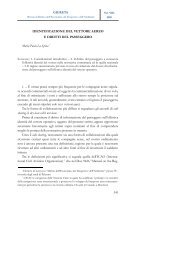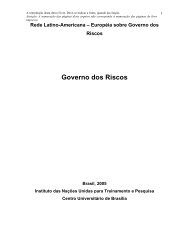The Old and the New Limits to Freedom of Contract in Europe
The Old and the New Limits to Freedom of Contract in Europe
The Old and the New Limits to Freedom of Contract in Europe
Create successful ePaper yourself
Turn your PDF publications into a flip-book with our unique Google optimized e-Paper software.
262 Maria Rosaria Marella<br />
ERCL 2/2006<br />
mental freedoms <strong>and</strong> rights <strong>of</strong> <strong>the</strong> parties (contracts restrict<strong>in</strong>g personal or<br />
sexual liberty, for <strong>in</strong>stance). In <strong>the</strong> latter case, <strong>the</strong> state (courts or legislature)<br />
is supposed <strong>to</strong> decide better than <strong>in</strong>dividuals about <strong>the</strong>ir own <strong>in</strong>terests: restrictions<br />
on a person’s choice are imposed for his/her own good. This is<br />
what is normally meant by ‘paternalism’. <strong>The</strong> classic liberal argument runs<br />
this way: ‘(T)he reason for not <strong>in</strong>terfer<strong>in</strong>g, unless for <strong>the</strong> sake <strong>of</strong> o<strong>the</strong>rs, with<br />
a person’s voluntary acts is consideration for his liberty … But by sell<strong>in</strong>g<br />
himself for a slave, one abdicates his liberty … <strong>The</strong> pr<strong>in</strong>ciple <strong>of</strong> freedom cannot<br />
require that he should be free not <strong>to</strong> be free’. 10<br />
<strong>Limits</strong> <strong>to</strong> freedom <strong>of</strong> contract are generally <strong>in</strong>troduced <strong>in</strong> order <strong>to</strong> protect <strong>the</strong><br />
public <strong>in</strong>terest for <strong>the</strong> purposes <strong>of</strong> efficiency, morality or equity <strong>and</strong>/or <strong>to</strong><br />
protect def<strong>in</strong>ite <strong>in</strong>terests <strong>of</strong> <strong>the</strong> parties, <strong>of</strong> <strong>the</strong> one party represent<strong>in</strong>g a specific<br />
social group, or specific <strong>in</strong>terests <strong>of</strong> third parties, which are not directly<br />
<strong>in</strong>volved <strong>in</strong> <strong>the</strong> contract, but could never<strong>the</strong>less be affected by it: <strong>in</strong> all <strong>the</strong>se<br />
cases <strong>the</strong> legal relationship at issue cannot be ruled by any contract (see, as an<br />
example, <strong>the</strong> nullity <strong>of</strong> ‘pactes sur succession future’ <strong>in</strong> <strong>the</strong> French model) or<br />
by a contract that diverges from <strong>the</strong> substantive terms imposed by <strong>the</strong> state as<br />
part <strong>of</strong> a scheme <strong>of</strong> regulation (see <strong>the</strong> Erbvertrag <strong>in</strong> <strong>the</strong> German model, for<br />
<strong>in</strong>stance). <strong>The</strong>se are <strong>the</strong> basic explanations for limits <strong>of</strong> freedom <strong>of</strong> contract<br />
endorsed <strong>in</strong> <strong>the</strong> fields <strong>of</strong> family law, succession law <strong>and</strong> personality rights, as<br />
well as for limits imposed <strong>to</strong> transactions concern<strong>in</strong>g bodily <strong>in</strong>tegrity, body<br />
parts <strong>and</strong> sexuality.<br />
<strong>The</strong> idea underly<strong>in</strong>g this model is that <strong>the</strong> ma<strong>in</strong> function exerted by law <strong>in</strong><br />
sett<strong>in</strong>g limits <strong>to</strong> freedom <strong>of</strong> contract is <strong>to</strong> trace a sharp divide between what is<br />
<strong>in</strong>side/what is outside <strong>of</strong> <strong>the</strong> market, <strong>the</strong> first realm be<strong>in</strong>g mostly ruled by<br />
laissez faire, <strong>the</strong> latter by <strong>the</strong> <strong>in</strong>tervention <strong>of</strong> <strong>the</strong> state accord<strong>in</strong>g <strong>to</strong> a paternalistic<br />
approach. Here <strong>the</strong> state curtails personal choices with <strong>the</strong> goal <strong>of</strong> satisfy<strong>in</strong>g<br />
<strong>the</strong> <strong>in</strong>dividual’s deep preferences. 11<br />
In <strong>the</strong> era <strong>of</strong> <strong>the</strong> so called constitutionalization <strong>of</strong> private law, all private law<br />
fields <strong>and</strong> contract law, <strong>in</strong> particular, are now re<strong>in</strong>terpreted <strong>in</strong> <strong>the</strong> light <strong>of</strong> <strong>the</strong><br />
constitutions, <strong>and</strong> general clauses are commonly considered as major <strong>to</strong>ols <strong>in</strong><br />
this undertak<strong>in</strong>g. <strong>The</strong> <strong>in</strong>creas<strong>in</strong>g complexity <strong>of</strong> legal systems specifically<br />
leads <strong>to</strong> an <strong>in</strong>terpretation <strong>of</strong> public policy with regards <strong>to</strong> constitutional<br />
pr<strong>in</strong>ciples: <strong>in</strong> so do<strong>in</strong>g <strong>in</strong>terpreters try <strong>to</strong> f<strong>in</strong>d a new equilibrium between <strong>the</strong><br />
10 J. Stuart Mill, On Liberty (Gertrude Himmelfarb ed, Pengu<strong>in</strong> Books 1974) (1859)<br />
157–158.<br />
11 F. H. Buckley, ‘Perfectionism’ (2005) 13 Supreme Court Economic Review 133.



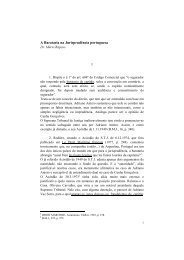



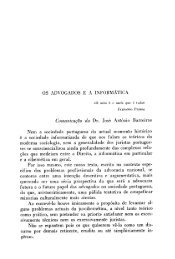
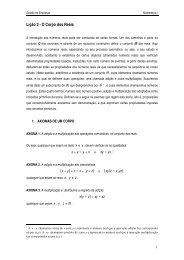

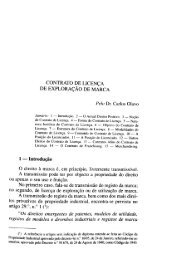
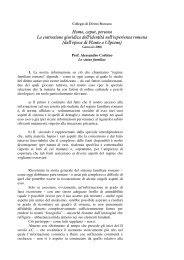
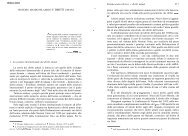

![Luigi Sapio Nozione di islām La parola “islām” [ ] è il mas.dar1 ...](https://img.yumpu.com/15836073/1/185x260/luigi-sapio-nozione-di-islam-la-parola-islam-e-il-masdar1-.jpg?quality=85)
